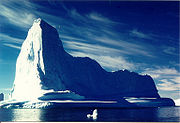WWF has welcomed the news that a pioneering expedition to deliver the most accurate measurements yet of the arctic ocean ice sheet has secured the funding it needs for the survey.


The survey team, led by the experienced British polar expedition leader Pen Hadow, will depart in mid-February and plans to spend over 100 days hauling ground-penetrating radar equipment over the ice to the North Pole.
 “The Arctic could be entirely ice-free in the summer as early as 2013, or as late as 2040. The more the ice disappears, the more vulnerable life in the Arctic becomes." Martin Sommerkorn, WWF International Arctic Programme’s Senior Climate Change Advisor
“The Arctic could be entirely ice-free in the summer as early as 2013, or as late as 2040. The more the ice disappears, the more vulnerable life in the Arctic becomes." Martin Sommerkorn, WWF International Arctic Programme’s Senior Climate Change Advisor
“This will allow climate scientists to refine their predictions for the climate of this region and the world,” says Martin Sommerkorn, Senior Climate Change Advisor for the WWF International Arctic Programme.


“The ice thickness in the Arctic has been the missing variable in being able to more accurately predict how quickly the arctic ice will melt away,” he said.
The trend of diminishing arctic ice due to climate change raises fears for entire arctic ecosystems that depend on the ice, from single-celled organisms, all the way up to larger animals.
The polar bear was recently listed as threatened by the US government, based on projections for the disappearance of the ice.
“The Arctic could be entirely ice-free in the summer as early as 2013, or as late as 2040,” said Sommerkorn.

“The more the ice disappears, the more vulnerable life in the Arctic becomes. What many people do not realise is that there are also climate feedbacks from the Arctic to the rest of the world.
“As arctic ice melts, it makes the climate more unstable across the whole world. We need to know the rate at which the ice is likely to go, to help us prepare, and to help us persuade governments of the urgency of immediate and effective action on limiting greenhouse gases.”

WWF is helping to support the Catlin Arctic Survey, and looks forward to receiving the data the expedition will generate. It will help feed into preparations for securing an effective global deal on climate change in Copenhagen in 2009.


The survey team, led by the experienced British polar expedition leader Pen Hadow, will depart in mid-February and plans to spend over 100 days hauling ground-penetrating radar equipment over the ice to the North Pole.
 “The Arctic could be entirely ice-free in the summer as early as 2013, or as late as 2040. The more the ice disappears, the more vulnerable life in the Arctic becomes." Martin Sommerkorn, WWF International Arctic Programme’s Senior Climate Change Advisor
“The Arctic could be entirely ice-free in the summer as early as 2013, or as late as 2040. The more the ice disappears, the more vulnerable life in the Arctic becomes." Martin Sommerkorn, WWF International Arctic Programme’s Senior Climate Change Advisor“This will allow climate scientists to refine their predictions for the climate of this region and the world,” says Martin Sommerkorn, Senior Climate Change Advisor for the WWF International Arctic Programme.


“The ice thickness in the Arctic has been the missing variable in being able to more accurately predict how quickly the arctic ice will melt away,” he said.
The trend of diminishing arctic ice due to climate change raises fears for entire arctic ecosystems that depend on the ice, from single-celled organisms, all the way up to larger animals.
The polar bear was recently listed as threatened by the US government, based on projections for the disappearance of the ice.
“The Arctic could be entirely ice-free in the summer as early as 2013, or as late as 2040,” said Sommerkorn.

“The more the ice disappears, the more vulnerable life in the Arctic becomes. What many people do not realise is that there are also climate feedbacks from the Arctic to the rest of the world.
“As arctic ice melts, it makes the climate more unstable across the whole world. We need to know the rate at which the ice is likely to go, to help us prepare, and to help us persuade governments of the urgency of immediate and effective action on limiting greenhouse gases.”

WWF is helping to support the Catlin Arctic Survey, and looks forward to receiving the data the expedition will generate. It will help feed into preparations for securing an effective global deal on climate change in Copenhagen in 2009.


No comments:
Post a Comment